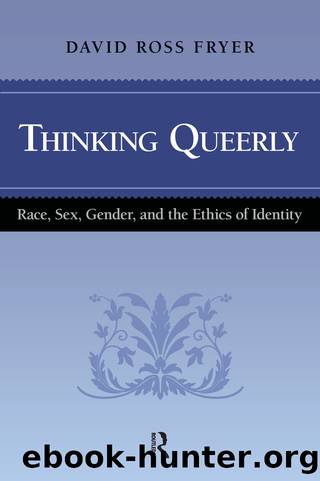Thinking Queerly by David Ross Fryer

Author:David Ross Fryer [Fryer, David Ross]
Language: eng
Format: epub
ISBN: 9781594513596
Barnesnoble:
Publisher: Taylor & Francis
Published: 2010-07-30T00:00:00+00:00
Right away we notice Butlerâs implicit definition of sex. By sex Butler does not refer to a drive or an act, as Foucault in part did. Rather, sex for Butler refers to a biological entity. She questions how to define or fill in that entity (hormones, chromosomes, anatomy), but it is clear that by sex she means âmale or female,â not heterosexual intercourse. Continuing, we can see already that there are problems with the sex/gender split as Butler found it while writing her book. Not only had feminism not sufficiently interrogated this most precious of all assumptions, Butler argues, but when put under proper scrutiny it began to show serious strain, for in our society gender did (and does) for the most part line up with sex along a binaryâmen are for the most part male and women are for the most part female, and regardless of masculinity and femininity, these basic gender identities are nearly as rigid as sex itself seems to be.
At this point there are several directions Butler could have gone. She could have assumed the stability of sex as a base and worked to further dislocate and distantiate gender from it. Or she could have made an argument that sex and gender are best seen as more closely linked and instead developed her theory into a type of sexual difference feminism. Instead, what Butler did was undermine the very idea of sex as a base for the superstructure of gender, exposing how gender is the dominant operative binary in society that needs to be undone; in other words, she did to sex and gender what Foucault did to sex and sexuality. First she engaged in a genealogically motivated philosophical analysis of Irigaray, Foucault, and Wittig to show how our culture produced the idea of sex as a material, ontological ground, relying on what Butler referred to as a âmetaphysics of substance.â Then she moved through careful analyses of Levi-Strauss and Lacan to explain how and, to a lesser extent, why this takes place, showing us how sex is posited as a prediscursive ground. Finally, she returned to Foucault, now finding herself able to make a strong case for what she had laid out at the beginning as one of Gender Troubleâs ultimate goalsâto show that, as she writes, âgender is not to culture as sex is to nature; gender is . . . [rather] the discursive/cultural means by which âsexed natureâ or a ânatural sexâ is produced and established as âprediscursive,â prior to culture, a politically neutral surface on which culture actsâ (1999, 10).7
The argument that sex is the product of the discourse of gender is in some ways complex, but ultimately is not difficult for Butler to make. First, relying mainly on Foucaultâs already established claims that sex is the product of discourses of sexuality, Butler applies this framework to the sex/gender split. In this she offers little in the way of new genealogical argument, instead trying to extend Foucaultâs claims to her own theme via analogy.
Download
This site does not store any files on its server. We only index and link to content provided by other sites. Please contact the content providers to delete copyright contents if any and email us, we'll remove relevant links or contents immediately.
Harry Potter and the Goblet Of Fire by J.K. Rowling(3025)
Unfinished: A Memoir by Priyanka Chopra Jonas(2911)
Never by Ken Follett(2873)
The Man Who Died Twice by Richard Osman(2290)
Machine Learning at Scale with H2O by Gregory Keys | David Whiting(2267)
Fairy Tale by Stephen King(2058)
Will by Will Smith(2033)
Rationality by Steven Pinker(1761)
The Storyteller by Dave Grohl(1656)
The Dawn of Everything: A New History of Humanity by David Graeber & David Wengrow(1564)
The Dark Hours by Michael Connelly(1562)
The Stranger in the Lifeboat by Mitch Albom(1529)
Cloud Cuckoo Land by Anthony Doerr(1428)
Friends, Lovers, and the Big Terrible Thing by Matthew Perry(1324)
The Becoming by Nora Roberts(1323)
Einstein: His Life and Universe by Walter Isaacson(1312)
Crying in H Mart by Michelle Zauner(1312)
New Morning Mercies: A Daily Gospel Devotional by Paul David Tripp(1301)
A Short History of War by Jeremy Black(1295)
